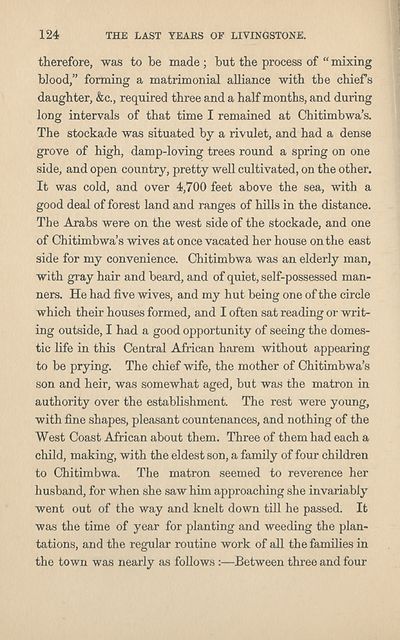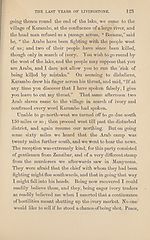Download files
Complete book:
Individual page:
Thumbnail gallery: Grid view | List view

124
THE LAST TEARS OF LIVINGSTONE.
therefore, was to be made ; but the process of “ mixing
blood,” forming a matrimonial alliance with the chiefs
daughter, &c., required three and a half months, and during
long intervals of that time I remained at Chitimbwa’s.
The stockade was situated by a rivulet, and had a dense
grove of high, damp-loving trees round a spring on one
side, and open country, pretty well cultivated, on the other.
It was cold, and over 4,700 feet above the sea, with a
good deal of forest land and ranges of hills in the distance.
The Arabs were on the west side of the stockade, and one
of Chitimbwa’s wives at once vacated her house on the east
side for my convenience. Chitimbwa was an elderly man,
with gray hair and beard, and of quiet, self-possessed man¬
ners. He had five wives, and my hut being one of the circle
which their houses formed, and I often sat reading or writ¬
ing outside, I had a good opportunity of seeing the domes¬
tic life in this Central African harem without appearing
to be prying. The chief wife, the mother of Chitimbwa’s
son and heir, was somewhat aged, but was the matron in
authority over the establishment. The rest were young,
with fine shapes, pleasant countenances, and nothing of the
West Coast African about them. Three of them had each a
child, making, with the eldest son, a family of four children
to Chitimbwa. The matron seemed to reverence her
husband, for when she saw him approaching she invariably
went out of the way and knelt down till he passed. It
was the time of year for planting and weeding the plan¬
tations, and the regular routine work of all the families in
the town was nearly as follows :—Between three and four
THE LAST TEARS OF LIVINGSTONE.
therefore, was to be made ; but the process of “ mixing
blood,” forming a matrimonial alliance with the chiefs
daughter, &c., required three and a half months, and during
long intervals of that time I remained at Chitimbwa’s.
The stockade was situated by a rivulet, and had a dense
grove of high, damp-loving trees round a spring on one
side, and open country, pretty well cultivated, on the other.
It was cold, and over 4,700 feet above the sea, with a
good deal of forest land and ranges of hills in the distance.
The Arabs were on the west side of the stockade, and one
of Chitimbwa’s wives at once vacated her house on the east
side for my convenience. Chitimbwa was an elderly man,
with gray hair and beard, and of quiet, self-possessed man¬
ners. He had five wives, and my hut being one of the circle
which their houses formed, and I often sat reading or writ¬
ing outside, I had a good opportunity of seeing the domes¬
tic life in this Central African harem without appearing
to be prying. The chief wife, the mother of Chitimbwa’s
son and heir, was somewhat aged, but was the matron in
authority over the establishment. The rest were young,
with fine shapes, pleasant countenances, and nothing of the
West Coast African about them. Three of them had each a
child, making, with the eldest son, a family of four children
to Chitimbwa. The matron seemed to reverence her
husband, for when she saw him approaching she invariably
went out of the way and knelt down till he passed. It
was the time of year for planting and weeding the plan¬
tations, and the regular routine work of all the families in
the town was nearly as follows :—Between three and four
Set display mode to:
![]() Universal Viewer |
Universal Viewer | ![]() Mirador |
Large image | Transcription
Mirador |
Large image | Transcription
| Antiquarian books of Scotland > Scotland/Scots > Last years of Livingstone > (132) |
|---|
| Permanent URL | https://digital.nls.uk/136058746 |
|---|
| Description | Thousands of printed books from the Antiquarian Books of Scotland collection which dates from 1641 to the 1980s. The collection consists of 14,800 books which were published in Scotland or have a Scottish connection, e.g. through the author, printer or owner. Subjects covered include sport, education, diseases, adventure, occupations, Jacobites, politics and religion. Among the 29 languages represented are English, Gaelic, Italian, French, Russian and Swedish. |
|---|

